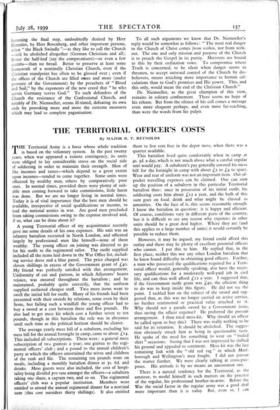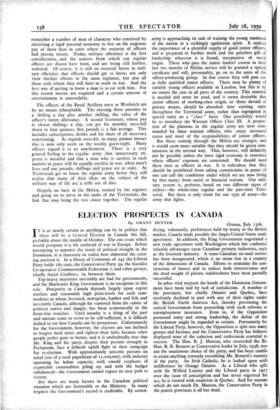THE TERRITORIAL OFFICER'S COSTS
By MAJOR B. T. REYNOLDS
THE Territorial Army is a force whose whole tradition is based on the voluntary system. In the past twenty years, when war appeared a remote contingency, its units were obliged to lay considerable stress on the social side of soldiering in order to maintain their strength. Men of like incomes and tastes—which depend to a great extent upon incomes—tended to come together. Some units were officered by wealthy men, others by comparatively poor ones. In normal times, provided there were plenty of suit- able men coming forward to take commissions, little harm was done. But we are no longer living in normal times. Today it is of vital importance that the best men should be available, irrespective of social qualifications or income, to lead the national armies in war. Are good men precluded from taking commissions owing to the expense involved and, if so, what can be done about it?
A young Territorial officer of my acquaintance recently gave me some details of his own expenses. His unit was an infantry battalion recruited in North London, and officered largely by professional men like himself—none of them wealthy. The young officer on joining was directed to go for his outfit to the regimental tailor. The outfit supplied included all the items laid down in the War Office list, includ- ing service dress and a blue patrol. The price charged was eleven shillings in excess of the Government grant of £40. My friend was perfectly satisfied with this arrangement. Uniformity of cut and pattern, in which Adjutants' hearts rejoice, was ensured throughout the battalion ; and he maintained, probably quite corretdy, that the uniform supplied outlasted cheaper stuff. Two more items went to swell the initial bill for outfit. Many of his friends had been presented with their swords by relations, some even by their firms, but failing such a windfall the young officer had to buy a sword at a cost between three and five pounds. He also had to get mess kit which cost a further seven to ten pounds, though in this battalion the rule was in abeyance until such time as the political horizon should be clearer.
The average yearly mess bill of a subaltern, excluding his mess bill for the annual fortnight in camp, came to about £14. This included all subscriptions. These were: a general mess subscription of two guineas a year; one guinea to the regi- mental officers' club ; and a pound to the annual children's party at which the officers entertained the wives and children of the rank and file. The remaining ten pounds went on meals, including a monthly battalion dinner at 35. 6d. and drinks. Mess guests were also included, the cost of hospi- tality being divided pro rata amongst the officers—a subaltern taking one share, a captain two, and so on. The regimental officers' club was a popular institution. Members were entitled to attend the annual regimental dinner for a nominal sum (this cost outsiders thirty shillings). It also entitled them to live rent free in the depot mess, when there was a quarter available.
This battalion lived quite comfortably when in camp at 45. 3d. a day, which is not much above what a careful regular unit would pay. A subaltern's pay generally covered his mess bill for the fortnight in camp with about £2 to £4 to spare. Wear and tear of uniform was not an important item. Out-of- pocket travelling expenses can be claimed. One can sum up the position of a subaltern in this particular Territorial battalion thus: once in possession of his initial outfit, his soldiering costs him about £12 a year, and the bulk of this sum goes on food, drink and what might be classed as amenities. On the face of it, this seems reasonable enough. I know the battalion in question : it is happy and efficient. Of course, conditions vary in different parts of the country, but it is difficult to see any reason why expenses in other units should be a great deal higher. Where they are (and this applies to a large number of units) it would certainly be possible to reduce them.
However, it may be argued, my friend could afford this outlay and there may be plenty of excellent potential officers who cannot. I put this to him. He replied that, in the first place, neither this nor any other London battalion that he knew found difficulty in obtaining good officers. Further, a man who possessed the qualifications required for a Terri- torial officer would, generally speaking, also have the neces- sary qualifications for a moderately well-paid job in civil life, and can thus well afford LIZ a year. I suggested that, if the Government outfit grant was £40, the efficient thing to do was to keep inside this figure. He did not see the point. I tackled him on the subject of the sword and sug- gested that, as this was no longer carried on active service, no further sentimental or 'practical value attached to it. Why should not a parade sword be a Government issue, thus saving the officer expense? He preferred the present arrangement. I then tried mess-kit. Why should an officer be called upon to buy this? There was really nothing to be said for its retention. It should be abolished. The sugges- tion obviously struck him as being in questionable taste. He spoke of the need for something to wear on "boiled shirt" occasions. Seeing that I was not impressed he shifted his ground and appealed to sentiment. Mess kit was the last remaining link with the "old red rag" in which Marl- borough and Wellington's men fought. I did not pursue the matter further. We were clearly talking at cross-pur- poses. His attitude is by no means an uncommon one.
There is a natural tendency for the Territorial, as the amateur, to model himself in such matters on the practice of the regular, his professional brother-in-arms. Before the War the social factor in the regular army was a good deal more important than it is today. But, even so, I can remember a number of men of character who contrived by exercising a rigid personal economy to live on the exiguous pay of those days in units where the majority of officers had private means. Today, military efficiency is the first consideration, and the sources from which our regular officers arc drawn have been, and are being still further, widened. Of course, it is still an essential factor in mili- tary efficiency that officers should get to know, not only their brother officers in the same regiment, but also all those with whom they will have to work in war. And the best way of getting to know a man is to eat with him. For this reason messes are required and a certain amount of entertainment is unavoidable.
The officers of the Royal Artillery mess at Woolwich are by no means inhospitable. The messing there amounts to a shilling a day plus another shilling, the value of the officer's ration allowance. A second lieutenant, whose pay is eleven shilling; a day, can get his monthly mess-bill down to four guineas; five pounds i; a fair average. This includes subscriptions, drinks and his share of all necessary entertaining. As regards mess-kit, in many gunner messes this is now only worn on the weekly guest-night. Many officers regard it as an anachronism. There is a very general feeling in the regular army that unnecessary ex- pense is wasteful and that a man who is careless in such matters in peace will be equally careless in war, when men's lives and not pounds, shillings and pence are at stake. As Territorials get to know the regular army better they will realise that many of their ideas on the subject of the military way of life are a trifle out of date.
Happily we have in the Militia, trained by the regulars and going on to serve in the ranks of the Territorials, the link that may bring the two closer together. The regular army is approaching its task of training the young manhood of the nation in a strikingly egalitarian spirit. It realises the importance of a plentiful supply of good junior officers, and is prepared to further merit and the priceless gift of leadership wherever it is found, irrespective of social origin. Those who pass the junior leaders' course in their last two months of Militia service will be granted a special certificate and will, presumably, go on to the units of the officer-producing group. In due course they will pass out as fully qualified junior officers. There may be plenty of suitable young officers available in London, but this is by no means the case in all parts of the country. This material is needed and must be used, and it seems desirable that junior officers of working-class origin, or those devoid of private means, should be absorbed into existing units throughout the Territorial army, rather than segregated in special units on a "class " basis. One possibility would be to introduce the Warrant Officer Class III. A propor- tion of the platoons in the regular army are now com- manded by these warrant officers, who enjoy increased status and most of the responsibilities of junior officers.
But those coming through the Militia are younger, and it would seem more suitable that they should be given com- missions in the normal way. This, however, will definitely not be possible unless the most rigid economy is exercised where officers' expenses are concerned. We should need these men as officers in war. It is ridiculous that they should be prohibited from taking commissions in peace (if one can call the conditions under which we are now living by that name) from social or financial reasons. Our mili- tary system is, perforce, based on two different types of soldier—the whole-time regular and the part-time Terri- torial. But there is only room for one type of army—the army that fights.









































 Previous page
Previous page